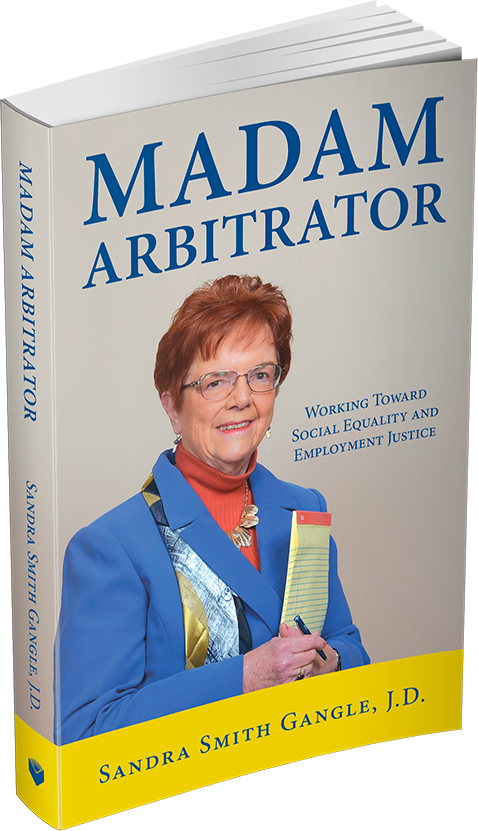
A guest post by Sandra Smith Gangle, J.D.,
Author of “Madam Arbitrator” (now available on Amazon)
Often, when I tell people I am an arbitrator, they bombard me with questions. “What does that mean?” “Are you a counselor? A mediator?” I have even been asked whether I “meditate in a particular religion.” And once, I was asked if I “prescribe medication” as part of my work.
The short answer is that an arbitrator is more like a judge than any of those other professionals. I am a labor arbitrator, which means I am neutral and impartial in labor relations matters. I am not biased in favor of either unions or management and I am knowledgeable in collective bargaining law. I apply labor contract language, like just cause, to resolving workplace disputes. I have been approved to conduct contested hearings in private industries and in the federal government, through FMCS, and in cases involving public employees like teachers, police officers and government workers though the states of Oregon, Washington and Alaska.
I also have arbitrated cases involving small claims in the Marion County Circuit Court. In those cases, where no jury was required, the judges could assign a private arbitrator to conduct the hearing and make a decision that was then enforceable as if it were a judicial order.
When I arbitrate a dispute, I conduct a hearing in which there is a claimant or grievant and a respondent who denies that the claim has any merit. I swear in witnesses for the claimant and respondent, so they must tell me the truth in their testimony. When the hearing ends, it is my duty to analyze the evidence (testimony and documents) in an objective and unbiased manner in light of the applicable legal standard, which is the private contract that the parties have negotiated or the public law in a court-connected arbitration. After carefully deliberating all the evidence, as well as the arguments made by the parties’ advocates, I decide whether the party that bore the burden of proof in the case convinced me that they proved their position by a preponderance, more than fifty percent, of the evidence. Then, if the claimant proved that the respondent violated the contract or law in some fashion, I must implement an appropriate remedy to make the claimant whole, that is, restore them to the condition they should have earned, as completely as possible.
Some non-union employees may see the word arbitration included in their employee handbook. They may believe they have the same protection as unionized workers, but they do not. If they believe they have been treated unfairly in the workplace, they may believe that an arbitrator will remedy their claim. Unfortunately, in such cases, which are known as employment arbitrations, there is usually no contractual right that an arbitrator can enforce, so the employer is more likely to prevail in the case. There is unlikely a just cause standard for termination, for instance, and there is probably no requirement that the employer consider seniority and qualifications when granting a promotion to a higher position.
For those reasons, I never accepted appointments in such cases. I knew the parties had played no role in creating the terms and conditions of employment, so I felt that the hearing would be biased in favor of the employer. My passion was to arbitrate cases in which the law of the case had been enacted through a democratic negotiation process, that is similar to a public law that is enacted by elected legislators. As a labor arbitrator, I always knew the employee-claimant would be represented by a union and the law of the case would be a collectively-bargained labor agreement, not the arbitrary policies of the employer.
I would enjoy talking to interested parties about how I became an arbitrator, where I practiced in a career heavily dominated by white males. My passion in writing my book, “Madam Arbitrator,” was to inspire other women and persons of color to choose to follow my road map to a great career as a legal practitioner.
Note: The author is now retired from her arbitration practice and is devoting her time to writing and speaking to groups of people who are interested in her career as a lawyer and arbitrator. Her website is www.madamarbitratorgangle.com. She can be reached at her e-mail address, ganglesandrajd@gmail.com, to schedule a book-discussion meeting, either in-person or virtually via Zoom.